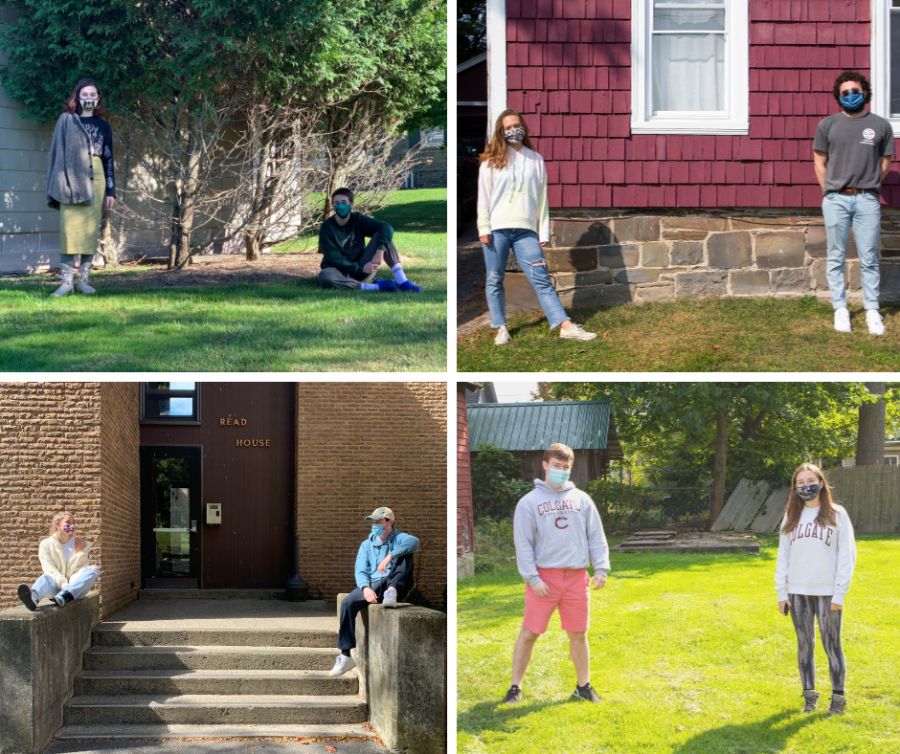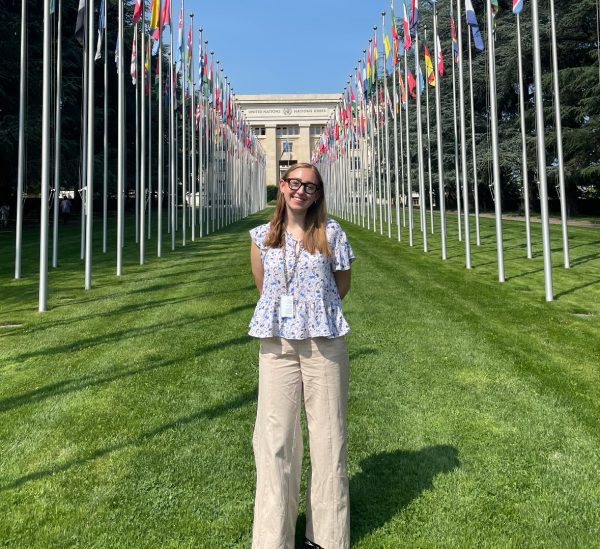Intimacy in the Time of Covid-19
CONTENT WARNING: Mentions of sex, consent violation and sexual violence.
Colgate’s Reopening plan has been clear on setting regulations and guidelines for what is and is not acceptable behavior this semester. Avoiding a COVID-19 outbreak on campus unfortunately means that we must face one cold hard truth: intimacy as we know it is gone. The University has outlined every aspect of life in the Reopening Plan except what – if any – role relationships and intimate encounters have this fall.
Above all, sex is a choice this semester. The University has clearly stated in the reopening plan and the Commitment to Community Health that there is to be no physical contact with individuals outside of the family unit this semester. Many students will choose to abstain from sex completely this semester, choosing to adhere to Colgate’s guidelines and support common safety over personal desire.
Junior Joanna Rodriguez believes that not everyone will strictly adhere to Colgate’s guidelines when it comes to their love lives.
“I understand why people would want to see their significant others, especially after spending possibly half a year apart … right now, having a significant other is kind [of] like being in a long distance relationship,” Rodriguez said. “I’m sure hook ups are still happening.”
According to Assistant Director of Survivor Support Services Denise Contreras, students who may be considering breaking these guidelines must accept personal accountability and understand the consequences of their choices.
“This part of intimacy is going to be about personal accountability on the students. That’s their responsibility in order to decide ‘will I break quarantine? Will I break Gate [1, 2 and 3] in order to engage in any type of activity? And if I do, it’s going to be at the cost of my peers and the institution,’” Contreras explained.
Contreras urges students to remember that while we face barriers to intimacy, many of us for the first time, some students face barriers on a daily basis, with or without a pandemic. The LGBTQ+ community, students of color and international students face sexual exclusion, fetishism, sexual violence and cultural differences in ideas of sex. The changes brought by Covid merely pile additional barriers onto the pre-existing struggles of some members of the community.
With the arrival and extended stay of Covid-19: sex has changed. Perhaps the biggest change lies within consent and communication. Now, more than ever, honest communication is vital to sexual encounters. Contreras stressed the importance of asking one’s partner if they’ve been in contact with someone who has tested COVID positive.
According to Contreras, in the past, people haven’t been honest about their sexual history, and that dishonesty resulted in the passing of STIs.
Because of COVID-19, personal accountability and obligation to one’s partner must be emphasized now more than ever before. Students have lied about STI results for years; now is not the time to lie. Now is the time to be honest in regards to who you or your partner(s) have been in contact with. Knowingly putting another person at risk is a new form of sexual violation; by not being truthful about our close contacts we put our partner(s) at risk of contracting COVID-19. By not being completely open and honest, we violate our partner’s trust and by definition engage in non-consensual acts. Partners absolutely must be educated on who their partner is seeing both sexually and non-sexually. In telling the truth to our partners and expressing our own needs, we must accept the risk of losing. Contreras explained this as being accepting of the fact that a partner may not be comfortable with or willing to consent to certain activities, and that’s okay. We must accept the boundaries set by others, both in sexual and non-sexual encounters. The ability to consent (and revoke previous consent) is a human right.
After receiving consent in the fullest and most excited sense, what does sex itself look like now? Individuals with COVID-19 show the virus in saliva, semen and feces, so NYC Health reiterates the importance of condoms and dental dams for minimizing contact with viral traces. Because the virus is present in saliva, it’s recommended that when having sex, people should avoid kissing and should wear masks. People should also wash their hands before sex and avoid touching their mouth, eyes or nose. Additionally, people are encouraged to avoid having sex if either partner is feeling ill or showing COVID symptoms. NYC Health stresses the importance of limiting contact with individuals outside of one’s home or family unit at Colgate and recommends limiting the size of a group in sexual encounters. Those who engage in sexual activity are advised to stick to one consistent partner.
Colgate’s Haven, the campus’ sexual violence survivor resource center, recommends masturbation during the pandemic, as NYC Health explains “masturbation will not spread Covid-19, especially if you wash your hands (and any sex toys) with soap and water for at least 20 seconds before and after sex.” Masturbation by oneself may be exciting, but a great way to have sexual intimacy with one’s partner while following university guidelines is Facetime or Zoom sex. Haven promotes virtual sex – whether it be over text or video—but again stresses the importance of consent. Are screenshots allowed? Are saving texts allowed? All of these questions and more are part of consent. Violating what is agreed upon would be a sexual violation. If you choose to have sex with a partner, consent must be established and respected at all times and may be revoked at any point as well. Remember, if you are ready for sex, you must be ready to risk being told ‘no.’
Contreras proposed a new intimacy beyond sex. She defined intimacy as merely two people connecting, and doesn’t have to be physical — it can exist in both romantic and platonic relationships.
“We’ve normalized [intimacy in] relationships and not friendships,” Contreras explained. “Why can’t we tell our friends we love them?”
In the time of Covid-19, we must return to the relationships which sustain our lives; we must return to our friends, family units and communities. In this time when we cannot seek outside touch, we have the option to replace physical intimacy with deeper emotional intimacy. We can rediscover our friends on a level far more profound than the physical surface. Interactions with friends are no longer hugging, watching movies or socializing; instead we sit apart and talk, divulging and discovering our and our friends’ truest selves. Regulations may limit physical intimacy, but they encourage emotional relationships.
“We need to ask our friends to hold us, to hold space for us in a way that we’ve never had to ask before,” Contreras said. Friendships in 2020 are about true care, true connection and true emotional intimacy. When craving touch, we must push ourselves to ask a housemate to hold us and to remind us that we are loved.
For junior Sarah Billings, honesty and communication are key.
“For a lot of newer or less stable relationships, they will have to be really upfront with each other about what they need beyond physical intimacy. The best thing we can do is be honest and be creative because this definitely isn’t easy.”
The full extent of the pandemic’s impact on relationships remains unclear, but Contreras explained that studies are coming out linking Covid-19 to an increase in suicidal ideation and mental health issues among college age groups. This stands as a reminder to students that we are not as alone in our struggle; college aged individuals across the nation are experiencing similar strife. The struggles we face during the pandemic reach far beyond our physical wellbeing, and demonstrate how truly important it is to be present for ourselves and our friends right now. If we have the space for it, we must be there to connect with our friends and to remind them that despite the space between us, our hearts remain linked as one.
“[Intimacy is] not a clear path anymore,” Billings explained. “Get to know someone. Take a risk and have a socially distanced date outside so maybe when this is over, you’ll have much more of a connection than you would have had before Covid.”
Covid-19 gives us a chance at a new normal — as described by poet Sonya Renee Taylor: “normal never was. Our pre-corona existence was never normal other than we normalized greed, inequity, exhaustion, depletion, extraction, disconnection, confusion, rage, hoarding, hate and lack. We should not long to return, My friends. We are being given the opportunity to stitch a new garment. One that fits all of humanity and nature.”
As the Covid-19 pandemic persists, we must fight for emotional intimacy when we cannot have physical intimacy. We must hold spaces, both physically and emotionally, for those who need us, and we must push ourselves to ask the same of our friends. The new normal established in the post-corona era doesn’t have to be one in which intimacy is limited to the surface; we must continue the ideation of deep emotional discovery.
*Students interested in more information on this topic can check out Haven’s website. The site will be posting additional information regarding safe sex during the pandemic. Additionally, Haven will be hosting a forum to further discuss intimacy during Covid-19 in the month of October.















